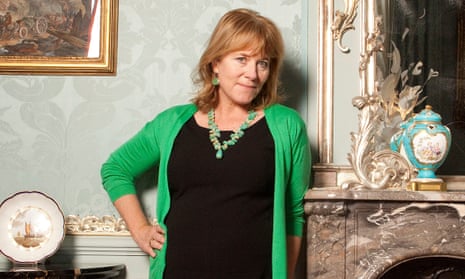The opening pages puzzled me. Reading the cavalcade of cliches in the prologue, I couldn’t perceive any quality that caused this novel to be elevated to the shortlist of the Baileys prize this month. Could it be that after the success of Ali Smith and Eimear McBride, the judges had been told to throw in some middlebrow contenders?
Or could the cliches have something to do with the subject matter, a society auction of a newly discovered old master – a satiric comment on the nullity of the characters on parade? For rocking up the steps of the auction house is a murky array of Russian billionaires, rap stars, hedgies and sheikhs, all keen to get hold of a 300-year-old oil sketch, The Improbability of Love.
This is a lengthy, baggy book that takes 100 pages to get going. Once it does, its sweep is almost Dickensian, taking us from high to low in society – though Rothschild is clearly more comfortable at the top end. Below the wealthy collectors and skint aristocrats are would-be chef Annie and her alcoholic mother, Evie, and Ralph Bernoff, luckless owner of the junk shop where Annie picks up a grubby oil painting for a song. Even lower down is the underclass, glimpsed in silhouette, flicking V-signs and keying expensive motors.
The grimy canvas turns out to be a lost Watteau, and Rothschild is fascinating on the arcana of art restoration, valuation, attribution and sale. Describing such things, her prose becomes crisp and crystalline. But we have a romance to get through first: that of dull Annie and smitten Jesse, who works at the Wallace Collection. The painting of a dancer, a lover and a clown that is “capable of inspiring love” ironically has no effect on Annie.
The canvas itself is given a voice, relating its provenance in arch, self-satisfied tones: “Anyway, back to the important issue: moi.” It remembers its poor creator’s early death and its many subsequent adventures, including being lugged to Paris as Napoleon’s war booty: “It was quite fun really, being with so many great paintings … it was the first time I had met Jan van Eyck’s Ghent Altarpiece [and] the Apollo Belvedere.” Once owned by Voltaire and Catherine the Great, it deplores its relegation to a poky London flat.
But powerful and sinister forces mean it can’t stay in a plastic bag for ever. The same canvas is being ardently sought by Memling Winkleman, a terrifying 90-year-old international art dealer. His browbeaten daughter Rebecca has no idea why the lost painting means so much to her father, who survived Auschwitz and has shown little emotion since. Tracking its whereabouts, she discovers something truly horrible, both about Memling and the art world itself.
Rothschild is a trustee of Tate and chair of the National Gallery (scenes at the latter show it to be peopled by saintly scholars) and her depiction of the rarefied art world is gripping. Some scenes don’t advance the plot but amuse nonetheless. The ineffectual Earl Beachendon, a director at Monachorum, risks the sack unless he can bring in a huge sale. Vulture-like, he descends on a decrepit collector, only to face a newly installed, much younger and extremely sharp wife. Then there’s Janacek, the Auerbach-like painter whose dingy studio is filled with masterpieces that he doesn’t need to sell, so austere is his lifestyle.
Also dancing through the plot is the delightful society fixer Barty Chesterfield Fitzroy St George (ne Reg Dunn), who has taken Vlad, a lugubrious thug of a Russian billionaire, under his wing. For all his frivolity, Barty has a kind and sensitive heart. Meanwhile, Vlad attempts to placate his far-off but all-knowing leader to chilling effect. The result is a slightly odd mixture of whimsy, horror and humour. But as Annie the caterer says, “When I can persuade three different random ingredients to go together and create something delicious, I am overcome by waves of happiness.”

Comments (…)
Sign in or create your Guardian account to join the discussion